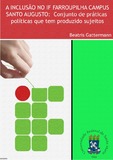| dc.creator | Gattermann, Beatris | |
| dc.date.accessioned | 2018-09-25T18:17:14Z | |
| dc.date.available | 2018-09-25T18:17:14Z | |
| dc.date.issued | 2017-09-05 | |
| dc.identifier.uri | http://repositorio.ufsm.br/handle/1/14384 | |
| dc.description.abstract | The present study is part of the research field of inclusion policies implemented in the Federal Institutes of Professional Education in Brazil and specifically in the Farroupilha Federal Institute. It can be included among the studies that use a post-structuralist perspective, based on the Foucaultian Studies especially the notions of governmentality, regulation and standardization for procedure and analytical development. It aims to identify and understand how the strategies of permanence and learning put into operation are producing other ways of saying about the student in a situation of non-learning. Methodologically for analysis was taken as basis the model of the inclusive policies devised in a discursive network for professional education and the possibility to untangle the ways to observe the part of the void that a pulled line causes in the model. Thus, in the first analytical unit, the study points to a set of international documents and it seeks to identify how the adoption of inclusion, as a way of determining of the conditions for education in the present time, can be explained in the order of neoliberal governmentality and how certain conditions of possibility are built for the reform in the professional education and creation of the Federal Institutes in Brazil. The second unit, shows the analysis of the discourses present in the IFFar documents that operate as a way of capturing young people for professional education. It verifies the emergence of inclusion discourses and learning as useful discourses for the management of student learning and permanence in vocational education. Finally, in the face of the emptiness left in the complex model of professional education, it becomes possible to show the discursive practices and tactics that take learning as a strategy of inclusion, in a discourse that is updated in the present, in relation to (in) exclusion and the production of people in situations of non-learning. | eng |
| dc.language | por | por |
| dc.publisher | Universidade Federal de Santa Maria | por |
| dc.rights | Attribution-NonCommercial-NoDerivatives 4.0 International | * |
| dc.rights.uri | http://creativecommons.org/licenses/by-nc-nd/4.0/ | * |
| dc.subject | Instituto federal | por |
| dc.subject | Educação profissional | por |
| dc.subject | Inclusão | por |
| dc.subject | Aprendizagem | por |
| dc.subject | Não aprendizagem | por |
| dc.subject | Federal institute | eng |
| dc.subject | Professional education | eng |
| dc.subject | Inclusion | eng |
| dc.subject | Learning | eng |
| dc.subject | Not learning | eng |
| dc.title | Inclusão no IF Farroupilha Campus Santo Augusto: conjunto de práticas políticas que tem produzido sujeitos | por |
| dc.title.alternative | Inclusion in IF Farroupilha Campus Santo Augusto: set of political practices that has produced subjects | eng |
| dc.type | Dissertação | por |
| dc.description.resumo | O presente estudo se insere no campo de investigação das políticas de inclusão implementadas nos Institutos Federais de Educação Profissional no Brasil e especificamente no Instituto Federal Farroupilha e pode ser inscrito entre os estudos que se servem de uma perspectiva pós-estruturalista, a partir dos Estudos Foucaultianos especialmente as noções de governamentalidade, normação e normalização para procedimento e desenvolvimento analítico. Tem como objetivo identificar e compreender como as estratégias de permanência e aprendizagem colocadas em funcionamento estão produzindo outros modos de dizer sobre o estudante em situação de não aprendizagem. Metodologicamente para análise tomou-se como base o desenho das políticas inclusivas tramadas numa rede discursiva para educação profissional e desta a possibilidade de desembaraçar os fios para ver parte do vazio que um fio puxado provoca no desenho. Assim, na primeira unidade analítica o estudo aponta para um conjunto de documentos internacionais buscando identificar como a adoção da inclusão, como forma de determinação das condições para educação na atualidade, pode ser explicitada na ordem da governamentalidade neoliberal e como se constroem determinadas condições de possibilidade para a reforma na educação profissional e criação dos Institutos Federais no Brasil. Na segunda unidade, busca-se a análise dos discursos presente nos documentos dos IFFar que operam como modo de captura dos jovens para a educação profissional, verificando a emergência dos discursos da inclusão e a aprendizagem como discursos úteis para gestão da aprendizagem e permanência do estudante na educação profissional. Por fim, diante do vazio deixado no desenho complexo da educação profissional, torna-se possível mostrar as práticas discursivas e as táticas que tomam a aprendizagem como estratégia de inclusão, num discurso que se atualiza, no presente, em relação à (in)exclusão e à produção de sujeitos em situação de não aprendizagem. | por |
| dc.contributor.advisor1 | Possa, Leandra Bôer | |
| dc.contributor.advisor1Lattes | http://lattes.cnpq.br/1050405469171971 | por |
| dc.contributor.referee1 | Machado, Fernanda de Camargo | |
| dc.contributor.referee1Lattes | http://lattes.cnpq.br/1050405469171971 | por |
| dc.contributor.referee2 | Bridi, Fabiane Romano de Souza | |
| dc.contributor.referee2Lattes | http://lattes.cnpq.br/8914947342465602 | por |
| dc.creator.Lattes | http://lattes.cnpq.br/5355213669618574 | por |
| dc.publisher.country | Brasil | por |
| dc.publisher.department | Educação | por |
| dc.publisher.initials | UFSM | por |
| dc.publisher.program | Programa de Pós-Graduação em Educação | por |
| dc.subject.cnpq | CNPQ::CIENCIAS HUMANAS::EDUCACAO | por |
| dc.publisher.unidade | Centro de Educação | por |



